
Hey babies, dig in and swing with the cool as we sat in on a chat with the cast and director of Cadillac Records.
Q: Jeffrey, youíre playing Muddy Waters, who is sort of a larger than life character. What did you do to prepare for this role?
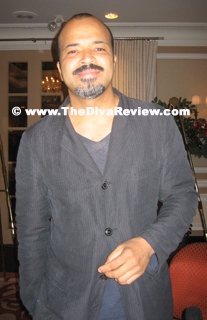 Jeffrey
Wright: I think
these guys were as large as life. These guys did everything but put on
the cape and the mask; they were superheroes, cos they had nothing. They
had resistance, if anything. Muddy Waters was a sharecropper, half a
minute away from a slave, denied basic freedoms, denied their manhood,
denied their dignity, humanity. But in spite of all that, they managed
to craft music that had universal resonance. There was an authenticity
to the way they expressed themselves thatís undeniable. Muddy Waters
was an illiterate, sitting on the porch in Mississippi with half of the
music of the latter half of the 20th
century in his back pocket, is a testament to their genius and their
strength, and for that reason they were larger than life. Howliní Wolf,
Willie Dixon, Chuck Berry, they crafted these personas and this
self-mythology that was a response, I think, to what was denied them,
but they were extraordinary Americans and extraordinary artists. If
artists can be heroes, then these guys were it.
Jeffrey
Wright: I think
these guys were as large as life. These guys did everything but put on
the cape and the mask; they were superheroes, cos they had nothing. They
had resistance, if anything. Muddy Waters was a sharecropper, half a
minute away from a slave, denied basic freedoms, denied their manhood,
denied their dignity, humanity. But in spite of all that, they managed
to craft music that had universal resonance. There was an authenticity
to the way they expressed themselves thatís undeniable. Muddy Waters
was an illiterate, sitting on the porch in Mississippi with half of the
music of the latter half of the 20th
century in his back pocket, is a testament to their genius and their
strength, and for that reason they were larger than life. Howliní Wolf,
Willie Dixon, Chuck Berry, they crafted these personas and this
self-mythology that was a response, I think, to what was denied them,
but they were extraordinary Americans and extraordinary artists. If
artists can be heroes, then these guys were it.
I discovered in the process of doing this thing how much I deeply loved these guys and the music that they created and the culture that they represent.
 Q:
Adrien, growing up in Queens, New York, did you listen to oldies radio
stations or blues records?
Q:
Adrien, growing up in Queens, New York, did you listen to oldies radio
stations or blues records?
Adrien Brody: Not in those days, and itís unfortunate because it was just from a lack of exposure to the music. I actually gained a tremendous appreciation for the blues from a friend of mine who is an aspiring rock musician; he turned me on to that. Their music is incredibly evocative in a universal sense. It stems from such hardship and transcending and overcoming and finding beauty and joy in life. I love the music.
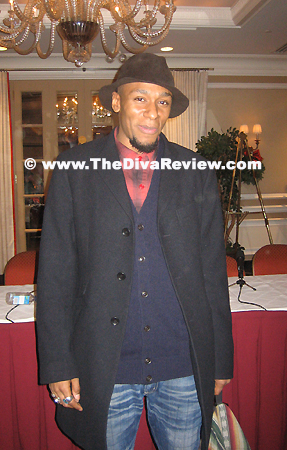 Q:
Mos Def, how did you prepare for the role of Chuck Berry?
Q:
Mos Def, how did you prepare for the role of Chuck Berry?
Mos Def: I got ready for the role by reading about Chuck; his autobiography, which is a very good read. YouTube was really helpful. The autobiography was really helpful cos a lot of it is written in the manner which you would you imagine Chuck Berry speaking if he were writing an autobiography, which is sort of flowery and itís got this very gentlemanly sort of storytelling quality to it and you find that a lot in his lyrics. Listening to the lyrics, I think that the lyrical aspect of Mr. Berryís work is very neat, itís distinctive. Itís something that really sets him apart from the generation of performers that he came up in and I think sets him apart in general not just a lot of rock and roll musicians, but a lot of musicians in particular. I really liked watching him talk. Hail, Hail Rock and Roll was another film that Iíve seen before that I watched a lot. And you know, practising the duck walk, putting unnatural strain on my legs.
JW: You know you always duck walk!
{All Laugh}
MD: Now itís hilarious, but when you duck walk when youíre shooting the movie, itís like, ďAnd weíre gonna go again.Ē My thighs and legs were like, ĎReally, really, seriously Mos, youíre gonna do this again? Havenít we been good to you, carrying you from place to place?í But I had a lot of fun doing it, but I was also really nervous because Chuck is a historical figure whoís still living, whoís still working all of the time if his recent movements are any indication.
Q: Did you talk with him?
MD: No, Chuck Berry was busy. Which was cool. There was a mischievous spirit to him, there was a gentlemanly quality but underneath it is like, a tiger. And given the context of the times that he came to prominence, itís almost like this subversive tongue-in-cheek thing that heís doing the whole time, but itís very forward and very dignified at the same time. So I was trying to capture that nature. Heís a man that took himself very seriously, a skilled man before he even became a musician, a carpenter, a businessman in his own right; someone who had really high aspirations for himself. I think itís interesting that he and Miles Davis came from the same town. They both played in two different idioms, but thereís a similar attitude about the way that they perceived themselves and the type of standards they set for themselves. Iím really honoured to just be part of this story and be a part of telling his story. Heís such a large, enigmatic, mercurial magical type of figure. I hope I did him justice; I had a good time besides the strained muscles.
Q: What do you think your characters would have thought or said about Barack Obamaís victory?
MD: Chuck Berry talking to Barack Obama? I have a feeling that already happened. Iíd like to be a fly on the wall. Whatís Chuck Berry gonna say to Barack Obama? ďSo, I was hoping for that inauguration gig.Ē
JW: It could be said that Barack Obama went to Chicago because of Howliní Wolf and Muddy Waters went to Chicago and all the folks that they represented. Muddy Waters lived on the south side of Chicago and thereís a very specific story that people are living there. Thereís a very specific origin to a lot of those lives. Thatís the reason that he went there to do his community organizing. There is a connection there, he was going to serve the community that these guys were a part of. They all left and Muddy Waters, Howliní Wolf, Chuck Berry reshaped popular music and we have great expectations of the way in which Barack Obama will reshape America.
 Cedric
the Entertainer: I
actually talked to a medium and they spoke for Willie Dixon and he said
Willie would want to write a song called ďBarack Obama Ainít Got the
Blues No More.Ē Itís a great song. Weíre still working on the bass
line. It would have Little Walter on it.
Cedric
the Entertainer: I
actually talked to a medium and they spoke for Willie Dixon and he said
Willie would want to write a song called ďBarack Obama Ainít Got the
Blues No More.Ē Itís a great song. Weíre still working on the bass
line. It would have Little Walter on it.
I think that these guys would be very happy to know that from the energy and the space from where they come that we live in that America and especially for the time in America that we show and what they had to live through. But itís very interesting, as musicians these guys were very free, you know? You understand that it was racial times, there was segregation and a lot of oppression, but because they were these bluesmen, these stars of music and they had a certain freedom that led them to believe that they lived in a world that was beyond the existence that really happened and I think that manifested itself to be so and even more so now today. Nowadays, we sure got problems and we got issues in this country, but I think the spirit of the attitude of finding yourself with writing music and writing songs and being free to do it and record, you live outside of societyís rules, so they were all Plaxico Burress.
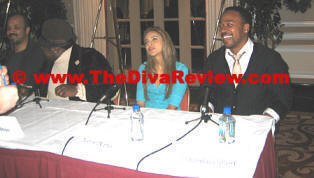 Q:
Was this film like a history lesson to you?
Q:
Was this film like a history lesson to you?
JW: I had to research all the lawsuits! Listening to Led Zeppelin, ďHey, wait a minute, thatís Muddy Waters!Ē I hear so many Muddy Waters references now in music that I hadnít heard before. I heard some, but now, itís unbelievable the extent to which he and they influenced modern music. The extent to which the influences were made was new information to me, I knew they were there but there are a number of songs Ö You ever heard this Elvis Presley song, ďTroubleĒ from King Creole, which is a direct rip-off of Hoochie Coochie Man, and itís the corniest stuff, {does Elvis imitation} ďIf youíre looking for trouble,Ē da do da da-da, ďIíll find ya some trouble.Ē
{All laugh}
Itís horrible.
Q: Cadillac Records takes place in the 1950ís, do you think youíd enjoy living in that decade as opposed to now, or is there another time youíd wished you could live in?
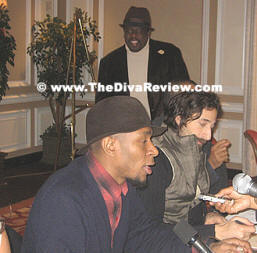 MD:
Iíd pick right now, the generation Iím from. Having been born in the
time that created hip-hop and as much as I love the jazz era from the
early 1900ís down to what Miles was doing, to what Jimi was doing, or
Coltrane. What I like about this generation is it instills a lot of
those influences, itís able to reference all of those difference idioms
without exclusion, everything from rock n roll to jazz to blues, all of
it finds its way in hip-hop and hip-hop as a result influences my music.
And not just the sonic aspect of it, thereís a whole other kinetic
aspect of it with dance and the visual aspect. Iím very proud and
honoured to be a part of that time and having born in that generation,
so for me itís right now.
MD:
Iíd pick right now, the generation Iím from. Having been born in the
time that created hip-hop and as much as I love the jazz era from the
early 1900ís down to what Miles was doing, to what Jimi was doing, or
Coltrane. What I like about this generation is it instills a lot of
those influences, itís able to reference all of those difference idioms
without exclusion, everything from rock n roll to jazz to blues, all of
it finds its way in hip-hop and hip-hop as a result influences my music.
And not just the sonic aspect of it, thereís a whole other kinetic
aspect of it with dance and the visual aspect. Iím very proud and
honoured to be a part of that time and having born in that generation,
so for me itís right now.
CtE: I would go late 70ís, just so I could wear a silver suit and play the trumpet with a shirt off like Earth, Wind and Fire. I donít think you can get away with that now. Just have silver overalls and no shirt on and play the trumpet while being in a band.
{All laugh}
JW: Well, the end of the 15th centuryÖ Still, thereís no place like home with the new president and all that, but I still wouldnít have minded sitting down there listening to Coltrane and Miles on stage at the same time. I wouldnít have minded doing that.
MD: But you know you gotta think about that era, too, man. There mustíve been one dude who had no idea where he was or what he was watching and would just talk.
{All laugh}
Iíd wanna go back in time and find that guy and say, ĎListen, be aware, itís not just another Saturday night out.í
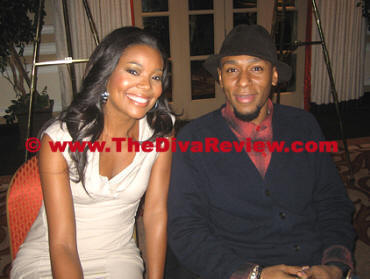 Gabrielle
Union: I like
personal freedoms, so Iím gonna go with now. I like voting without
harassment, I like not being chased by dogs and drinking out of any
water fountain I like. If I was gonna be the wife of somebody famous,
Iíd much
rather do it now, thereís better swag! Yeah, Iíd have to go with
personal freedom, so now. Now is better.
Gabrielle
Union: I like
personal freedoms, so Iím gonna go with now. I like voting without
harassment, I like not being chased by dogs and drinking out of any
water fountain I like. If I was gonna be the wife of somebody famous,
Iíd much
rather do it now, thereís better swag! Yeah, Iíd have to go with
personal freedom, so now. Now is better.
 Eamonn
Walker: My time, I
actually enjoyed the time I came up cos I was one of those guys who was
around when punk was going down. I worked in a bar called the Hope and
Anchor in London and I hated it, I couldnít take it. I said ďWhat is
this terrible music?Ē I couldnít take it. I thought, ĎThis is terrible
noise, and Iím working here cos I needed some money,í but that changed
music forever. People spitting on each other, theyíve got badges pinned
to their faces. I spoke over all of that.
Eamonn
Walker: My time, I
actually enjoyed the time I came up cos I was one of those guys who was
around when punk was going down. I worked in a bar called the Hope and
Anchor in London and I hated it, I couldnít take it. I said ďWhat is
this terrible music?Ē I couldnít take it. I thought, ĎThis is terrible
noise, and Iím working here cos I needed some money,í but that changed
music forever. People spitting on each other, theyíve got badges pinned
to their faces. I spoke over all of that.
AB: I grew up in this time and I actually have a tremendous connection to hip-hop. I lived in Queens, in the birth of hip-hop, the same influences that probably affected Mos. I found connection to the music and it affected me deeply. I compose music and the music I make is a collage of the sound of the environments the trains the horns blaring and everything and that cacophony of New York and growing up in a city like this is musical to me and has also affected my work as an actor. I can relate to so much and so many different environs. Itís very similar to me in a sense, so I connect to that its part of what shaped me as a man, so this is something I relate to. I love music in general; I love classical music, Iíve gained a tremendous appreciation for it. I love Al Bowlly and early 30ís music is beautiful, as well, and jazz and classic rock. Hip-hop was the first music that spoke to me, that kind of went from Pink Floyd on an 8-track to KRS-1 and that was it for a long time and Iíve kind branched out.
 Darnell
Martin: Well, I love
the social relevance of the music of the 60ís, but I gotta say, like
Gabrielle, as a black woman, I donít wanna go back in time to the
1960ís. Itís a scary place! But Aretha - just coming out of what was
happening politically Ė Sam Cooke, what they were saying was phenomenal
lyrically.
Darnell
Martin: Well, I love
the social relevance of the music of the 60ís, but I gotta say, like
Gabrielle, as a black woman, I donít wanna go back in time to the
1960ís. Itís a scary place! But Aretha - just coming out of what was
happening politically Ė Sam Cooke, what they were saying was phenomenal
lyrically.
 Columbus
Short: I guess Iíll
always have this vision of carrying Charlie Birdís {Parker} horn.
Jazz speaks to me in a different way. I grew up playing piano, playing
horns in a jazz trio. Jazz music has a certain type of language without
speaking and I think humanity, we want to try to evolve to that place
where we donít always have to say things with words, but the music is
never speaking. When Miles was playing, he was saying a monologue, you
know? When you have these guys doing what they were doing back then, I
wanted to be right there. I wish I could have just sat in for one
session. Let me just play with you one time.
Columbus
Short: I guess Iíll
always have this vision of carrying Charlie Birdís {Parker} horn.
Jazz speaks to me in a different way. I grew up playing piano, playing
horns in a jazz trio. Jazz music has a certain type of language without
speaking and I think humanity, we want to try to evolve to that place
where we donít always have to say things with words, but the music is
never speaking. When Miles was playing, he was saying a monologue, you
know? When you have these guys doing what they were doing back then, I
wanted to be right there. I wish I could have just sat in for one
session. Let me just play with you one time.
~ The Lady Miz Diva
December 1st, 2008
© 2006-2022 The Diva Review.com






















